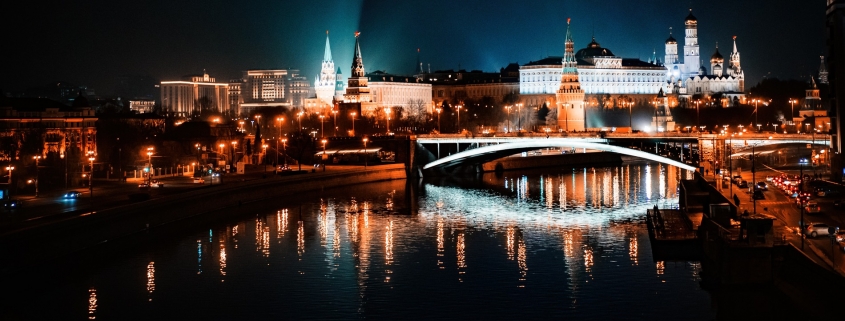In our interview series about international PR providing insight into PR trends and local differences in PR practices from more than 20 countries*, today’s interview shows why you have to be very creative when choosing an even location, and why social media marketing does not necessarily support a company’s marketing goals in today’s interview with Russian PR expert Yulia Kiseleva.
* The series is based on phone or face-to-face interviews and written input, therefore please excuse language mistakes which might reflect foreign language influences.
1. What is the latest trend (change) in PR you have identified in your region?
Yulia Kiseleva: In Russia most PR agencies are so-called full-service agencies who offer services in all communication disciplines. People still do not understand the exact meaning of PR, and we often have to explain the difference between PR and advertisement to our clients. In daily practice, PR and advertisement are combined in almost every campaign of any client.
Due to the financial crisis, work with clients has become more challenging for PR agencies: clients now expect more ROI for their budgets and look for creative and cost-efficient campaigns. A high level of coverage achieved by “financial support” for the media definitely does not make them happy any more. At the same time, the financial crisis had very little impact on the market for advertisement, which is still very popular.
Digital PR is not as powerful in Russia as it is in Europe; people trust printed media more than any online communication channel. A number of companies have tried to present themselves in different social media, but the result was not very promising. Just to give you an example: During a PR conference the representative of one agency informed the audience about a successful campaign in a social network, but in the end this resulted in 500 members of a group. This can hardly be named a success in a country with a population of more than 141 million people. While Facebook has reached a membership of slightly more than 1,1 million people (as of May 31, 2010), Vkontakte is still number one among the social networks in Russia and the CIS with about 90 million users.
One thing that really matters in Russia if you want to raise attention is news worthiness. Most media are interested in any information that catches the eye of their readers and is really attractive to them – the “hotter” and “more scandalous” the news the better for them. Details about the issue concerned are often neglected. Therefore many press releases from companies – except major players – which would be highly appreciated in European media are totally rejected by Russian media even if the news is relevant for them. Therefore Russian PR agencies have to be very creative to place news and stories in the media.
2. How does your agency handle / embrace this?
Yulia Kiseleva: Our PR Consultants are very experienced and know the media environment very well. Some of them have worked as journalists for renowned media before joining our agency, such as “Kommersant” or “Moskovskij Komsomolets”. Still, it’s a real challenge to place topics and stories and organize events with limited budgets that balance the client’s targets with the interests of the media. At the same time, creating a special atmosphere is crucial to the success of the event – and that’s really not easy in a city like Moscow, that has seen all types of events already. Our job is to implement PR programs on international standard – but with Russian “flavour”.
3. Can you give a recent example from a project?
Yulia Kiseleva: For one of our clients, BGN fashion brand, GlobalCom Russia has organized the presentation of their new collection to the media. For this purpose, our first task was to select the “face” of this new collection, and our choice was the Russian actress Marina Aleksandrova. She attended the presentation of the new collection in Moscow, which was hold in the event and exhibition location PROEKT_FABRIKA.
The problem was that in France the collection was presented in a very romantic style, like in a French village. The client wanted to apply the same concept in Russia and just adapt it to the look and feel of the Russian countryside. But as you can imagine, there is a huge difference between a French and a Russian village. Therefore it was quite a difficult task to create a romantic village atmosphere “in Russian style”. In the end we chose a gallery with a green environment and created a very natural atmosphere with birds singing, the smell of hay, live rabbits and exclusive hand-made decorations.
4. Are there any PR practices in which you think your region differs from PR in other part of the world?
Yulia Kiseleva: One of the most requested services is the positioning of experts in the media. According to the Russian mentality, the higher the position of the spokesperson in his company and industry and the better his performance as a reliable expert, the better the image of the whole company will be represented.
We present our experts to the media – for example during a press-breakfast – and inform the media about the topics we are going to talk about. The media knows us very well and we receive regular requests from journalists for quotes and industry expertise. Thus we are able to position our clients in the top media.
Regarding the mix of PR initiatives and tools, I also see a difference between major western PR markets and Russia. Here in Russia, PR industry is still very much event-driven, and celebrities, especially for the lifestyle sector, are very popular. “Just” providing information is not enough. If you are preparing a press event, you always have to keep in mind that location and atmosphere – including food and drink – will contribute as much to the success of the event as the topics presented.
You also have to be aware of important details regarding the work with the media and their own working process. In the editorial offices you have the following situation: there is a journalist who writes the article, and an editor who creates the headlines. As the headline has to attract the attention of the reader, the editor tries make it catchy which is a real risk for clients. You can have a very positive article, but the equivocal headline can destroy the effect. And we have a similar problem with the positioning of the articles on the news page: One day we managed to place a very positive article for one client, including a big picture of the owner. The article took about half of the page. And on the same page – on top of the text about our client – the editor placed his article titled “You should be able to identify swindlers by their face”.
5. Can you describe common mistakes foreign companies make?
Yulia Kiseleva: Don’t underestimate the complexity of Russian language – the localization of Russian texts is still a major obstacle for a foreign company on the way to a successful PR campaign in Russia. Especially localizing web-texts may become a real headache, as they seem to be so easy to translate, but often national connotations are not recognized and adequately translated. Translations should always be done by Russian native speakers – a incorrect translation can kill a whole campaign.
The second most popular mistake is to avoid press events when a company doesn’t have Russian-speaking representatives. Here Russia differs from markets such as France. First of all, it’s no problem to find a good interpreter and secondly: Russian journalists like foreign specialists. This is based on a common belief in Russia that foreign experts are more reliable and competent than Russian ones, especially in matters of market research and international SEO. So if you have foreign speakers at a press conference, you will most probably have even more participants from the media.
A third common mistake is choosing outdated TV for today’s campaigns. For some reason, some companies believe they are still popular, but this is definitely not the case. These ads look very old-fashioned and unattractive to Russian viewers.
6. What do clients from other markets need to keep in mind when they plan to do PR in your region?
Yulia Kiseleva: My first advice is to find a local agency which understands the Russian background and mentality. A foreign agency most probably will not be able to know which PR instruments will be the most efficient ones in Russia, while a Russian agency will be capable to develop the most efficient and successful mix of services and instruments to reach the clients’ PR goals. Additionally, a local PR agency will have the necessary contacts to journalists, industry experts and key opinion leaders “behind the scene” that keep things going.
At the same time, though, I have to stress that PR budgets in Russia may be significantly higher than in Western Europe – considering that Moscow, economic and political center of Russia, is one of the most expensive cities in the world. To give you an example: advertising prices in a popular Russian newspaper can be as high as 84 000 USD (Arguments & Facts newspaper – circulation in Russia is 3 000 000 pcs.) or 110 500 USD (Antena Telesem newspaper – circulation in Russia 3 800 000 pcs.).
***
Next week our international PR interview series will visit Sophia in Bulgaria. Learn why Bulgarian media rarely asks questions in press conferences, why the latest Heineken beer and Pampers campaigns used Facebook as a main communication channel and why the high acceptance of new communication channels causes problems in the use of the local language.
_____________________________________________________________
GlobalCom Russia is a full-service PR agency founded in 2000 and is one of the key players on the market for Russian corporate communications. The agency provides a unique set of solutions to its customers, including full range of PR methods, advertisement, marketing services, media strategy building, branding, content writing services, interactive and BTL tools. Among the clients of the agency are companies like the Russian Railways Corp, the Pension Funds of the Russian Federation, Altimo, Oracle, S7 Airlines and, Zepter International


